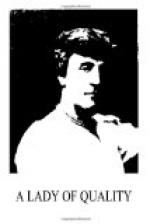* * * * *
In a huge chamber hung with tattered tapestries and barely set forth with cumbersome pieces of furnishing, my lady lay in a gloomy, canopied bed, with her new-born child at her side, but not looking at or touching it, seeming rather to have withdrawn herself from the pillow on which it lay in its swaddling-clothes.
She was but a little lady, and now, as she lay in the large bed, her face and form shrunken and drawn with suffering, she looked scarce bigger than a child. In the brief days of her happiness those who toasted her had called her Titania for her fairy slightness and delicate beauty, but then her fair wavy locks had been of a length that touched the ground when her woman unbound them, and she had had the colour of a wild rose and the eyes of a tender little fawn. Sir Jeoffry for a month or so had paid tempestuous court to her, and had so won her heart with his dashing way of love-making and the daringness of his reputation, that she had thought herself—being child enough to think so—the luckiest young lady in the world that his black eye should have fallen upon her with favour. Each year since, with the bearing of each child, she had lost some of her beauty. With each one her lovely hair fell out still more, her wild-rose colour faded, and her shape was spoiled. She grew thin and yellow, only a scant covering of the fair hair was left her, and her eyes were big and sunken. Her marriage having displeased her family, and Sir Jeoffry having a distaste for the ceremonies of visiting and entertainment, save where his own cronies were concerned, she had no friends, and grew lonelier and lonelier as the sad years went by. She being so without hope and her life so dreary, her children were neither strong nor beautiful, and died quickly, each one bringing her only the anguish of birth and death. This wintry morning her ninth lay slumbering by her side; the noise of baying dogs and boisterous men had died away with the last sound of the horses’ hoofs; the little light which came into the room through the ivied window was a faint yellowish red; she was cold, because the fire in the chimney was but a scant, failing one; she was alone—and she knew that the time had come for her death. This she knew full well.
She was alone, because, being so disrespected and deserted by her lord, and being of a timid and gentle nature, she could not command her insufficient retinue of servants, and none served her as was their duty. The old woman Sir Jeoffry had dubbed Mother Posset had been her sole attendant at such times as these for the past five years, because she would come to her for a less fee than a better woman, and Sir Jeoffry had sworn he would not pay for wenches being brought into the world. She was a slovenly, guzzling old crone, who drank caudle from morning till night, and demanded good living as a support during the performance of her trying duties; but these last she contrived to make wondrous light, knowing that there was none to reprove her.




